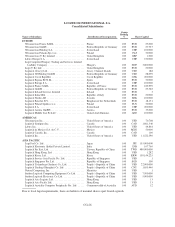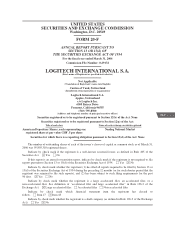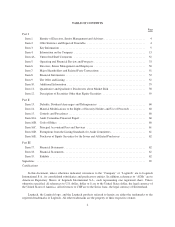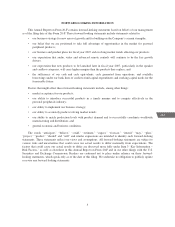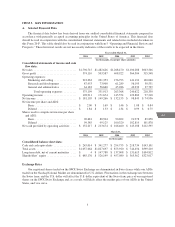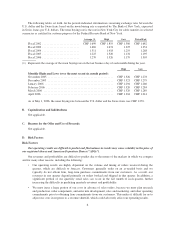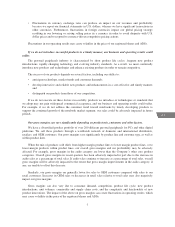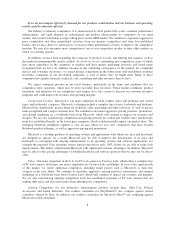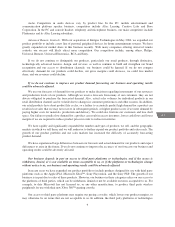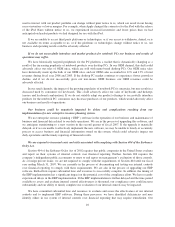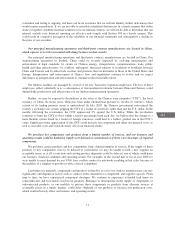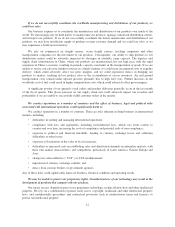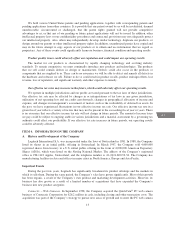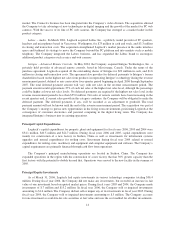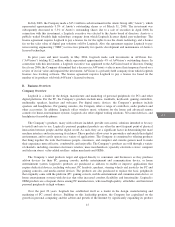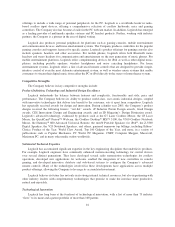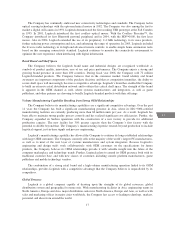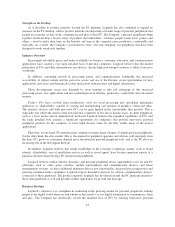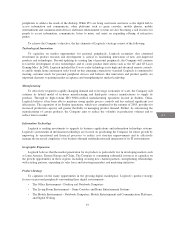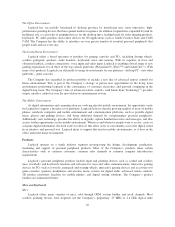Logitech 2006 Annual Report Download - page 68
Download and view the complete annual report
Please find page 68 of the 2006 Logitech annual report below. You can navigate through the pages in the report by either clicking on the pages listed below, or by using the keyword search tool below to find specific information within the annual report.used to interact with our product portfolio can change without prior notice to us, which can result in our having
excess inventory or lower margins. For example, when Apple changed the connector for the iPod with the release
of the iPod Nano without notice to us, we experienced increased inventories and lower prices than we had
anticipated on headset products we had designed for use with the iPod.
If we are unable to access third party platforms or technologies, or if our access is withdrawn, denied, or is
not available on terms acceptable to us, or if the platforms or technologies change without notice to us, our
business and operating results could be adversely affected.
If we do not successfully introduce and market products for notebook PCs our business and results of
operations may suffer.
We have historically targeted peripherals for the PC platform, a market that is dynamically changing as a
result of the increasing popularity of notebook products over desktop PCs. In our OEM channel, this shift could
adversely affect our sales of OEM mice, which are sold with name-brand desktop PCs. Our OEM mice sales
have historically made up the bulk of our OEM sales, and our OEM sales accounted for 12% and 13% of total
revenues during fiscal year 2006 and 2005. If the desktop PC market continues to experience slower growth or
decline, and if we do not successfully grow our non-mouse OEM business, our OEM revenues could be
adversely affected.
In our retail channels, the impact of the growing popularity of notebook PCs is uncertain, but may result in a
decreased need by consumers for keyboards. This could adversely affect our sales of keyboards and desktops
(mouse and keyboard combination). If we do not suitably adapt our product offerings to successfully introduce
products for the notebook PC, consumers may decrease purchases of our products, which would adversely affect
our business and results of operations.
Our business could be negatively impacted by delays and complications resulting from our
implementation of a new enterprise resource planning system.
We use enterprise resource planning (“ERP”) software in the operation of our business and maintenance of
business and financial data related to our daily operations. We are in the process of upgrading this software, and
we anticipate transitioning to a new version in the second quarter of fiscal 2007. If the upgrade is materially
delayed, or if we are unable to effectively implement the new software, we may be unable to timely or accurately
process or access business and financial information stored on the system, which could adversely impact our
daily operations and the timely reporting of financial results.
We are exposed to increased costs and risks associated with complying with Section 404 of the Sarbanes-
Oxley Act.
Section 404 of the Sarbanes-Oxley Act of 2002 requires that public companies in the United States evaluate
and report on their systems of internal controls over financial reporting. Further, Section 404 requires the
company’s independent public accountants to attest to and report on management’s evaluation of those controls.
As a foreign private issuer, we are not required to comply with the requirements of Section 404 until our fiscal
year ending March 31, 2007. We are currently in the process of documenting and testing our internal controls
over financial reporting to comply with these requirements. We are also in the process of upgrading our ERP
software. Both efforts require substantial time and resources to successfully complete. In addition, the timing of
the ERP implementation has a significant impact on the potential cost of the compliance effort. We have recently
experienced delays in the ERP implementation. If the ERP implementation is further delayed and the time period
available to assess and evaluate internal control effectiveness is shortened, our compliance costs could increase
substantially and our ability to timely complete our evaluation of our internal controls may be impacted.
We have committed substantial time and resources to evaluate and assess the effectiveness of our internal
controls and to implement ERP software. During these processes, we have identified deficiencies and may
identify others in our system of internal controls over financial reporting that may require remediation. Our
10


